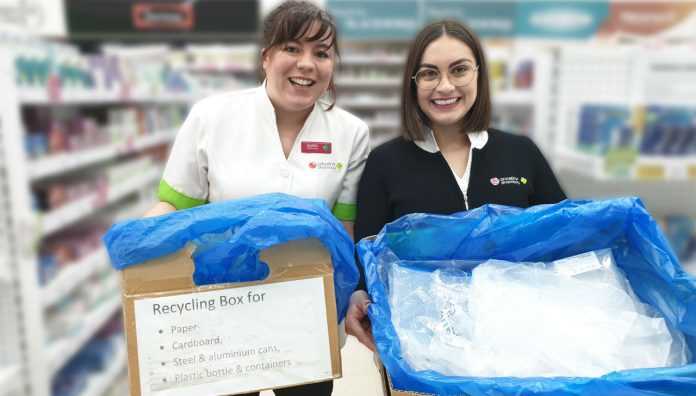The healthcare sector was recently called out for the devastating levels of waste generated from single-use plastics and medicines. Both hospital and community pharmacists can help to tackle this problem.
Waste generated from the health care sector accounts for 7% of Australia’s total annual CO2 emissions, almost double the level of the UK’s percentage of total emissions (4%).
While public and private hospitals account for 44% of those emissions, medicines– both PBS and others – account for 19% of Australia’s health sector CO2 emissions.1
‘Are pharmacists, as QUM [Quality Use of Medicines] specialists aware of the significant impact of pharmaceuticals on the environment?’ asks Grace Wong, Senior Pharmacist at Western Health and Founder of Pharmacists for the Environment, an online community which looks to identify ways in which pharmacists can reduce waste in their practice.
The advocacy group aims to promote awareness in the pharmacy profession about environmental issues and stimulate initiatives for change.
Ms Wong and many others see pharmacists playing a crucial role in helping reduce waste from the sector and ensuring public health.
The 2015 Rockefeller Foundation-Lancet Commission on Planetary Health emphasised the link between human health and the environment, the natural system that humans depend on.2
‘I believe an understanding and acknowledgment of this link is critical for any pharmacist to really, truly engage with their patients in conversations and also be open and able to instigate and support actions in reducing the pharmacy’s environmental footprint,’ Ms Wong said.
For those pharmacists working in hospitals, they can support and participate in developing hospital wide initiatives, such as a Local Sustainability Action Plan (LSAP).
Thinking outside the box is vital. ‘Western Health pharmacy were recently involved with contributing unneeded syringes to the production of 3D printed cutlery for people with dexterity issues as part of Melbourne Design Week,’ Ms Wong said.
But while hospitals are the main source of waste from the sector, community pharmacies can play an important role, but need coordination.
‘You need a champion in your store for reducing waste, always coming up with another idea for waste reduction and mindfulness,’ said Lauren Haworth, a community pharmacist based in Victoria.
Central to waste reduction in community pharmacies is handling medicines waste through the Return Unwanted Medicines (RUM) program: a free, convenient, and environmentally safe way for the public to dispose of unwanted and expired medication via their local community pharmacy.
‘Advertise the RUM program – reducing medicines ending up in our waterways limits the environmental harm they can cause and is really important,’ Ms Haworth said.
She encourages community pharmacists to develop a thorough system for handling recyclable and non-recyclable waste, with separate bins for paper, label shredding, soft plastics, cardboard paper, and normal kerbside recycling.
Options for recycling and reuse also go beyond the kerbside; Ms Haworth’s pharmacy collects their bubble wrap, which goes to local op-shop for reuse. ‘And our local footy club collect our cardboard and paper recycling, sort it, and then on-sell it to help fund the club.’
‘We also buy our vaccines in bulk packs of ten instead of individual vaccines. We have a recycling box in our consultation room for these boxes, along with recycling boxes in our bathroom and staff room. We haven’t started composting here yet, but it’s in the pipeline,’ she said.
When it comes to plastic bags, Ms Haworth advises to cut them. ‘Use paper bags; there is no reason for plastic. Even better, encourage patients to bring in their own bags. Start a loyalty program giving patients an extra point or two if they bring in their own bag, much like Woolies do,’ she said.
Ultimately, waste reduction and protecting the environment is central to a pharmacist’s role.
‘Judicious use of resources is a part of providing quality healthcare,’ Ms Wong said. ‘It doesn’t oppose delivery of quality healthcare. If we care for our patients, then we need to also care about the environment, the resources which we use, and the impact of waste on the environment, which supports their and our own ability to live well.’
Image: Lauren Haworth (left) and Intern Pharmacist Corie Raymond recycling in action.
References
- Malik A et al. The carbon footprint of Australian health care. Springer 2018. At: https://www.sciencedirect.com/science/article/pii/S2542519617301808
- Whitmee S. Safeguarding human health in the Anthropocene epoch: report of The Rockefeller Foundation–Lancet Commission on planetary health. The Lancet 2015;VOLUME 386, ISSUE 10007. At: https://www.thelancet.com/journals/lancet/issue/vol386no10007/PIIS0140-6736(15)X0015-8



 Professor Margie Danchin[/caption]
Professor Margie Danchin[/caption]

 Dr Peter Tenni[/caption]
Dr Peter Tenni[/caption]
 How should we deprescribe gabapentinoids, according to the Maudsley Deprescribing Guidelines[/caption]
How should we deprescribe gabapentinoids, according to the Maudsley Deprescribing Guidelines[/caption]



 Pharmacists have always prescribed, but they have the potential to prescribe much more
Pharmacists have always prescribed, but they have the potential to prescribe much more




